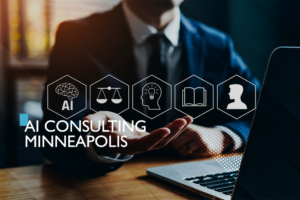AI Consulting Minneapolis
How to Select the Right Partner for Business Growth
Years in Business
Completed Projects
AI consulting Minneapolis services have become essential for businesses seeking competitive advantages in today’s market. Companies across the Twin Cities are discovering that artificial intelligence implementation requires specialized expertise to achieve meaningful results.
The Minnesota business landscape presents unique opportunities for organizations ready to integrate AI solutions strategically. Smart implementation starts with choosing the right consulting partner who understands both technology capabilities and local market dynamics.

Effective consultants provide comprehensive assessments of existing systems, identify automation opportunities, and create roadmaps for gradual AI integration. These services typically include process analysis, vendor evaluation, staff training programs, and performance monitoring frameworks.
Local market conditions in Minnesota create specific advantages for AI adoption, particularly in manufacturing, healthcare, financial services, and logistics sectors. The state’s strong educational infrastructure and tech talent pool support sustained AI initiatives.
Minneapolis Web Design understands these regional dynamics and helps businesses navigate technology decisions that align with local workforce capabilities. Success requires balancing innovation with practical implementation timelines that respect existing operational constraints.
Most effective AI consulting engagements begin with thorough discovery phases lasting 4-6 weeks, followed by pilot project development and scaled deployment. Industry statistics show that companies working with experienced consultants achieve 40% faster implementation times and 35% higher success rates compared to internal-only initiatives. The right consulting partner brings proven methodologies, vendor relationships, and risk mitigation strategies that prevent common pitfalls.
Minnesota businesses benefit from consultants who understand state-specific regulations, particularly in healthcare and financial sectors where compliance requirements influence AI deployment strategies. Local consultants provide ongoing support that ensures long-term success rather than one-time implementations. This approach creates sustainable competitive advantages while building internal capabilities for future innovation.
Hiring qualified AI developers in the Twin Cities requires understanding both technical competencies and cultural fit within Minnesota’s collaborative business environment. The current market shows strong demand for professionals with machine learning expertise, data engineering skills, and domain-specific knowledge relevant to your industry. Successful hiring strategies focus on candidates who demonstrate practical problem-solving abilities rather than purely theoretical knowledge.
Local talent acquisition benefits from Minnesota’s universities and technical programs that produce skilled graduates in computer science, data analytics, and engineering disciplines. The Minnesota AI talent acquisition process should include technical assessments, portfolio reviews, and scenario-based interviews that evaluate candidates’ abilities to translate business requirements into technical solutions. Companies report best results when they define clear project scopes and success metrics before beginning recruitment efforts.
Competitive compensation packages in the Minneapolis market typically range from $95,000 to $165,000 annually for experienced AI developers, with additional equity considerations for startup environments. Benefits packages that emphasize professional development, conference attendance, and certification support attract top-tier candidates. Remote work flexibility has become essential for accessing broader talent pools while maintaining Minnesota-based team coordination.
Successful hiring strategies include partnerships with local technical recruiters who understand AI specializations, participation in Minnesota technology meetups and conferences, and development of internship programs with regional universities. Companies should expect 3-6 month hiring timelines for senior positions, with junior developers available more readily. The investment in proper hiring processes pays dividends through reduced turnover and faster project completion times.
Selecting the right AI consulting partner requires systematic evaluation of technical capabilities, industry experience, and cultural alignment with your organization’s values. Leading Minneapolis AI companies demonstrate expertise through case studies, client testimonials, and measurable outcomes from previous engagements. The evaluation process should include technical interviews, reference checks, and pilot project proposals that showcase the consultant’s approach to your specific challenges.
Financial considerations extend beyond initial project costs to include ongoing support, maintenance requirements, and scaling expenses. Industry data indicates that companies allocate 15-25% of their initial AI investment toward first-year support and optimization activities. Transparent pricing models that clearly define deliverables, timelines, and success metrics prevent scope creep and budget overruns. Smart organizations negotiate performance-based components that align consultant incentives with business outcomes.
Local market advantages include proximity for face-to-face collaboration, understanding of Minnesota business practices, and familiarity with regional compliance requirements. Practical AI implementation benefits from consultants who can provide rapid response times and on-site support when needed. The right partner brings established relationships with technology vendors, access to specialized tools, and experience navigating common implementation challenges.
Due diligence should include verification of certifications, review of recent project portfolios, and assessment of team stability and growth patterns. Companies that invest in thorough partner evaluation report 60% higher satisfaction rates and 45% better long-term outcomes. The selection process typically requires 4-8 weeks for comprehensive evaluation, but this investment prevents costly mistakes and project delays.
Successful AI implementation follows structured phases that begin with pilot projects and scale gradually based on proven results. Minnesota businesses achieve best outcomes when they start with clearly defined use cases that offer measurable benefits within 6-12 months. The implementation timeline should account for staff training, system integration requirements, and change management processes that ensure user adoption.

Technical integration requires careful attention to existing systems, data quality issues, and security protocols that protect sensitive information. Minnesota’s regulatory environment, particularly in healthcare and financial services, demands robust compliance frameworks that maintain data privacy while enabling AI functionality. Implementation partners should provide detailed security assessments and compliance documentation throughout the deployment process.
Success metrics should include both quantitative measures like cost savings and efficiency gains, plus qualitative indicators such as user satisfaction and process improvement feedback. Minnesota AI implementation strategies that incorporate regular performance reviews and optimization cycles achieve 50% better long-term results. Regular assessment periods allow for course corrections and ensure continued alignment with business objectives.
Return on investment optimization requires careful selection of AI applications that address genuine business challenges rather than pursuing technology for its own sake. Industry research shows that companies focusing on specific operational improvements achieve 3-5x better ROI compared to broad, unfocused AI initiatives. Strategic consulting partnerships help identify high-impact opportunities that deliver measurable results within realistic timeframes.
Cost management strategies include phased implementation approaches that spread investments across multiple budget cycles while building internal capabilities. Minnesota businesses report optimal results when they allocate 60% of AI budgets toward implementation and 40% toward training and change management activities. Strategic planning frameworks that incorporate multiple scenarios help organizations prepare for various outcomes and adjust strategies based on early results.
Long-term value creation depends on building internal capabilities that reduce dependence on external consultants while maintaining access to specialized expertise for complex projects. The most successful organizations develop hybrid models that combine internal teams with strategic consulting relationships. This approach provides flexibility for scaling AI initiatives while controlling costs and maintaining competitive advantages.
Performance monitoring systems should track both immediate operational benefits and longer-term strategic advantages such as improved decision-making capabilities and enhanced customer experiences. Companies that implement comprehensive measurement frameworks report 40% higher satisfaction with AI investments and clearer pathways for future expansion. The right consulting partner provides ongoing optimization support that ensures continued value delivery as business needs evolve.
AI consulting rates in Minneapolis typically range from $150-$400 per hour depending on expertise level and project complexity. Most engagements involve project-based pricing that ranges from $25,000 for basic assessments to $200,000+ for comprehensive implementation projects. The investment often pays for itself within 12-18 months through efficiency gains and cost reductions.
AI consulting projects typically require 3-9 months from initial assessment to full implementation, depending on scope and complexity. Discovery and planning phases usually take 4-6 weeks, followed by development and testing periods of 2-4 months. Pilot implementations often show results within 6-8 weeks, allowing for early validation and adjustments.What industries in Minnesota benefit most from AI consulting?
Manufacturing, healthcare, financial services, logistics, and retail sectors show the highest AI adoption rates in Minnesota. These industries benefit from automation opportunities, predictive analytics capabilities, and process optimization that AI technologies enable. Agricultural businesses and food processing companies also find significant value in AI applications for supply chain and quality management.
While technical staff can be helpful, experienced AI consultants work effectively with business stakeholders to identify opportunities and implement solutions. The most important requirement is having team members who understand business processes and can articulate operational challenges. Consultants typically provide training and support to help internal teams manage AI systems long-term.
Key questions include asking about relevant industry experience, specific case studies with measurable outcomes, implementation methodologies, ongoing support options, and team qualifications. Request references from similar-sized companies and ask about their approach to change management, data security, and performance measurement. Understanding their pricing model and timeline expectations helps set realistic project expectations.
Every moment your digital presence isn’t optimized, you’re leaving revenue and customer loyalty on the table. Strategic web experiences drive engagement.
In today’s market, brands that fail to tell a compelling story lose trust, traction, and market share. Effective marketing builds credibility.
Secure your no-obligation strategy session now—and walk away with a complimentary custom homepage design. Only 5 slots available each month!

 How Much Does a Website Cost for Minnesota Businesses?
How Much Does a Website Cost for Minnesota Businesses?